(Learning Teaching and Training Activities)
The Faculty of Technics and Technology of Yambol, Trakia University of Stara Zagora, Bulgaria, hosted the second Learning Teaching and Training Activities (LTT) event of the European project Fashion DIET. The second LTT was held online from the 6th until the 8th of April 2022 and was attended by a diverse audience:
- The Fashion DIET project consortium members, i.e. the University of Education Freiburg as the coordinator and Reutlingen University, both located in Germany, Gheorghe Asachi Technical University of Iaşi in Romania and Trakia University of Stara Zagora in Bulgaria.
- Scientists, students and PhD students of the partner institutions and Erasmus+ students of the Gheorghe Asachi Technical University of Iaşi.
- Scientists and PhD students of the Technical University of Sofia, Bulgaria; South-West University Neofit Rilski of Blagoevgrad, Bulgaria; Polytechnic University of Tirana, Albania, and Arizona State University, USA.
- Teachers of vocational and art schools in Bulgaria and professionals in the fashion and textile industry in Bulgaria, Romania and Germany as well as freelance artists and fashion designers.
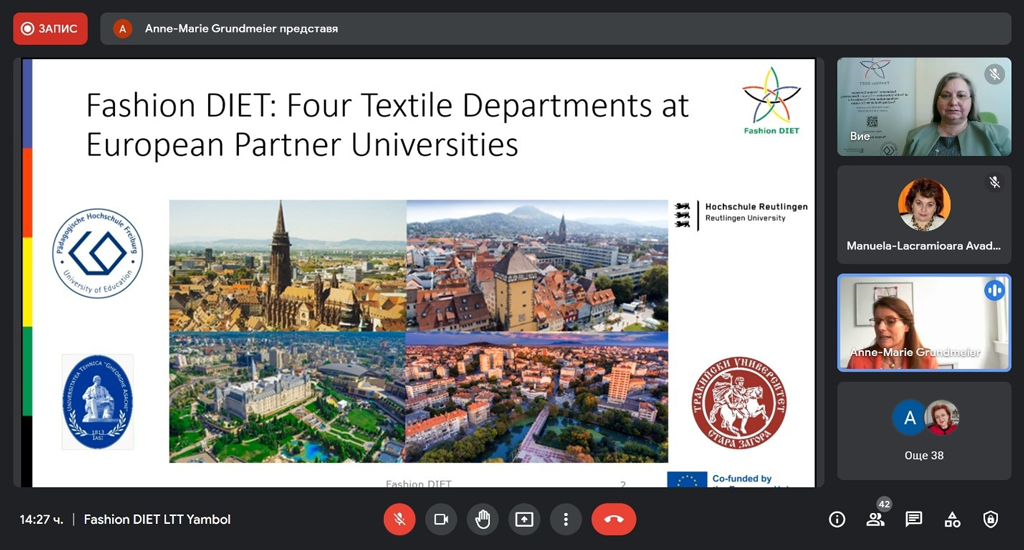
Figure 1: Partner institutions of the Fashion DIET project
The First Day, 6 April 2022
The second LTT event was officially opened by Prof. Dr. Zlatina Kazlacheva of Trakia University. Prof. Dr. Dobri Yarkov, Rector of Trakia University, gave a warm welcome to all participants.
The introductory presentation – co-presented by Prof. Dr. Anne-Marie Grundmeier, University of Education Freiburg, as the Fashion DIET project coordinator, Prof. Dr. Mirela Blaga and Prof. Dr. Jochen Strähle, Technical University of Iaşi and Reutlingen University – provided in-depth insights into the project’s main goals and outcomes. Next, Prof. Grundmeier gave more details on the integration of Education for Sustainable Development (ESD) as a guiding principle in textile education in her presentation. Following that, Prof. Dr. Antonela Curteza from the Technical University of Iaşi gave an interesting talk on researches on ethical fashion perception and reverse value chains. The first day ended with a presentation given by Prof. Dr. Zlatina Kazlacheva on the golden and fibonacci geometry in sustainable fashion design.
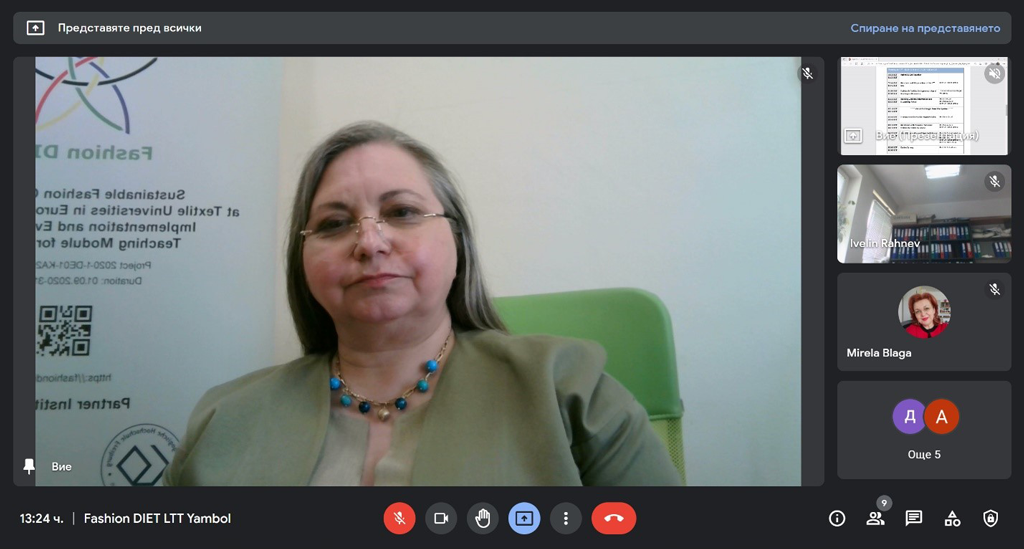
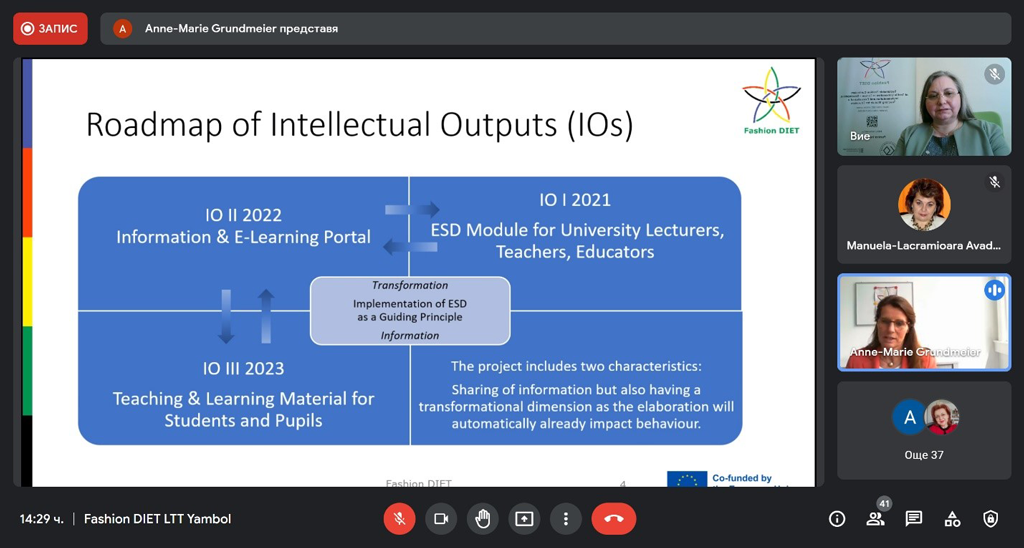
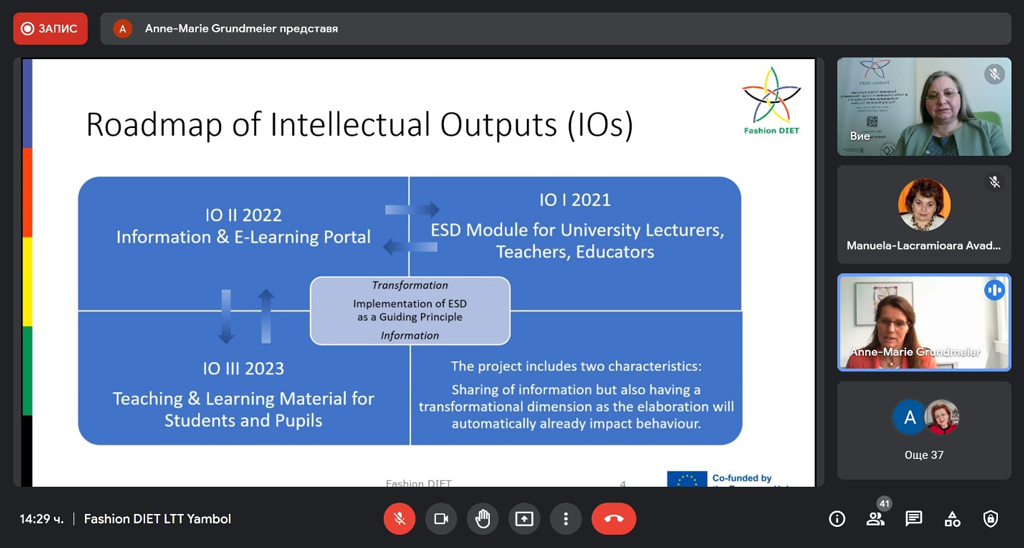
The Second Day, 7 April 2022
The second day of the LTT was mainly dedicated to the handling of the two central databases of the project. For a participatory development, the ESD module was firstly tested and evaluated in a workshop by lecturers and educators from the partner countries. In a next step, selected lectures of the open access e-learning platform Glocal Campus were opened for participants to gain an overview of the contents. The workshop “Working with the Information and E-Learning-Portal” was demonstrated by Marlen Wagner, Dr. Marcus Adam and Prof. Dr. Jochen Strähle from Reutlingen University. In addition, the Fashion and Textile Resource Centre (F+TRC), a comprehensive database to collect up-to-date information on fashion and textile related topics, was the subject of another workshop led by Dr. Marcus Adam and Prof. Dr. Jochen Strähle. Prior to working with the databases, Thomas Rehmet from Reutlingen University gave a presentation on entrepreneurship in the textile and fashion industry. Furthermore, Dr. Deniz Köksal shared his experience on transparency in fashion supply chains within his presentation and selected video documentation about the clothing production in Asia.
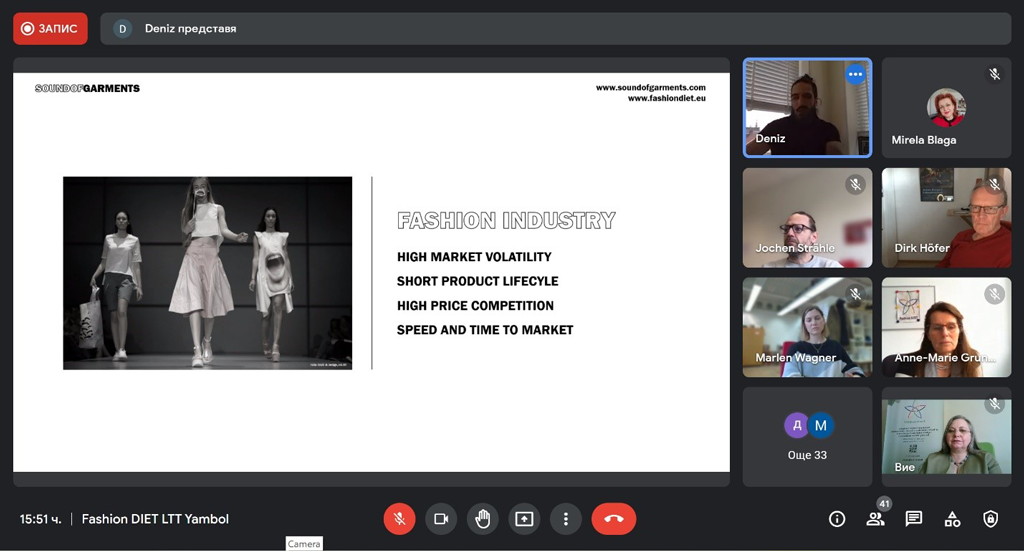
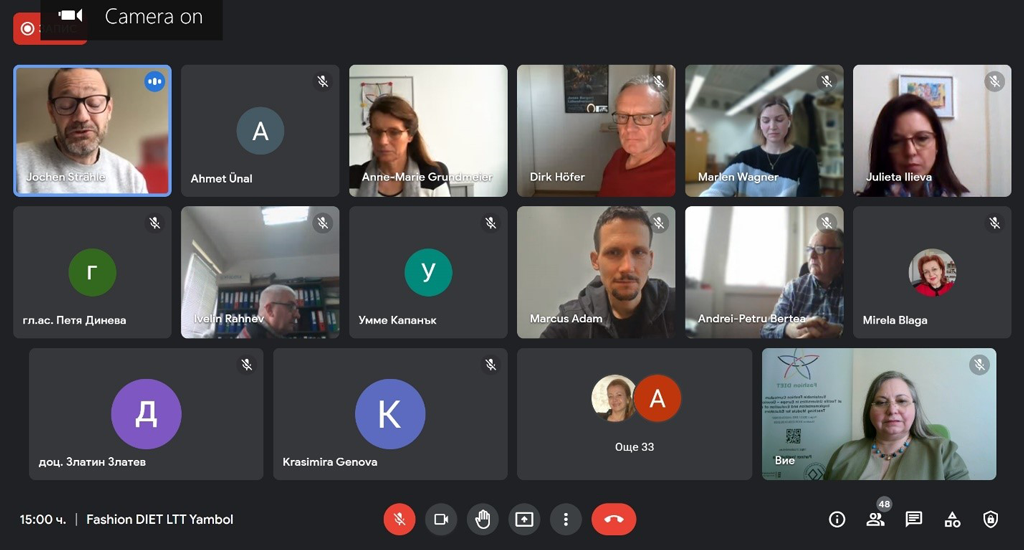
The Third Day, 8 April 2022
The lectures of the third day opened a space for an exchange of cultural views regarding ESD as well as lectures highlighting the thematic range of ESD and the ever-changing fashion market.
First, Prof. Dr. Jochen Strähle and Dr. Marcus Adam presented on the “Current Status of the ESD-Module – Goals, Intercultural Perspectives and Clashes”. This was followed by selected presentations on
- Sustainability Aspects in Knitwear Production,
- Long Life Fashion Design and Pattern Making, and on
- Microplastic Fibres and Particles in the Textile Chain – Environmental Impact and Health Effects.
These talks were given by Prof. Dr. Mirela Blaga, Prof. Dr. Zlatina Kazlacheva and Prof. Dr. Dirk Höfer, respectively.
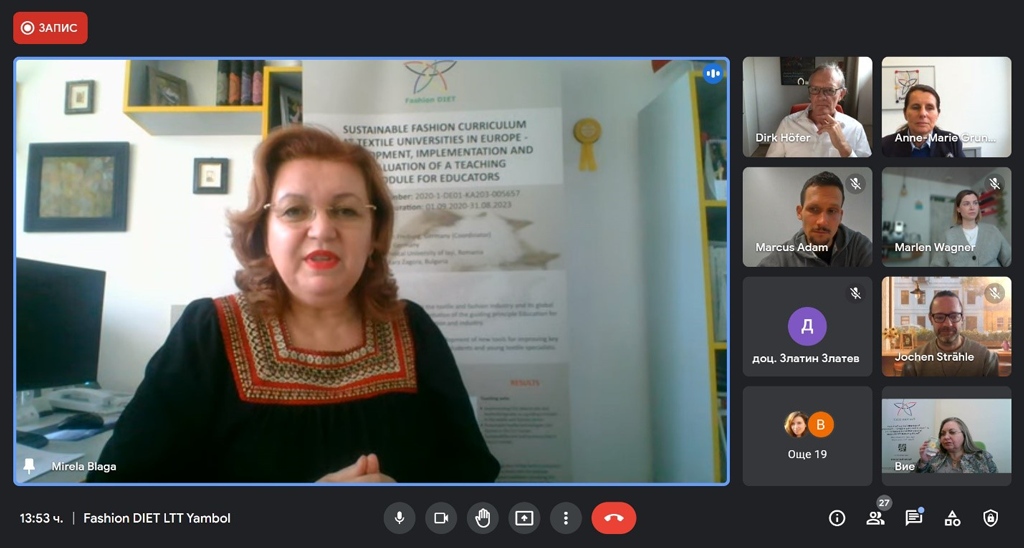
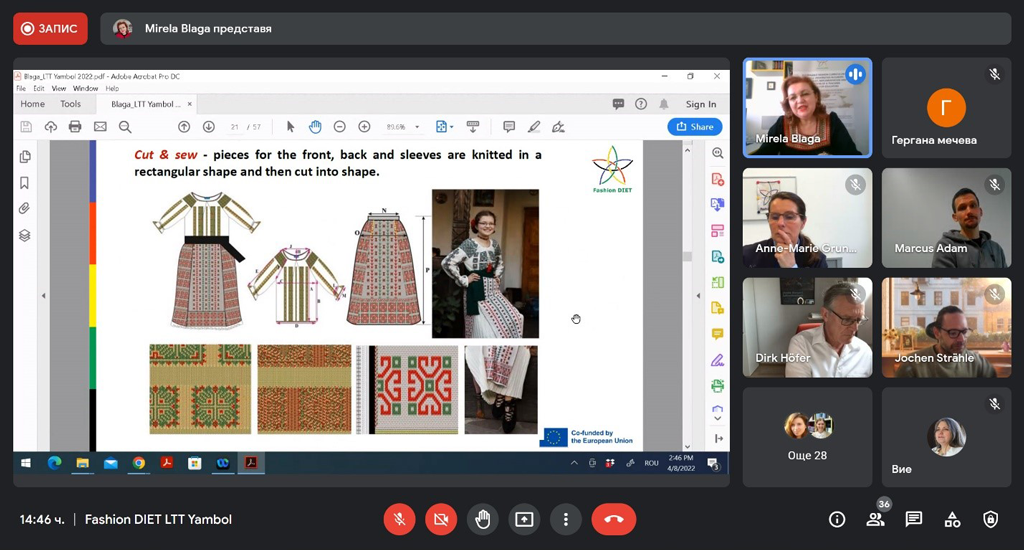
The third day closed with two contributions and a vivid discussion on design aspects in the context of sustainability. To this Prof. Galina Mihaleva from the Arizona State University, USA, gave an insight into her design work with a spectacular presentation on “Fashion Design in a Changing World”. In the final contribution of the LTT, Elvys Sandu presented REDU, a project developed by the NGO Mai Bine. Within his presentation “The Textile Rescue Boat”, he shared his ideas on this community-based sustainable design initiative in Iaşi that targets at up-cycling of consumer textiles.
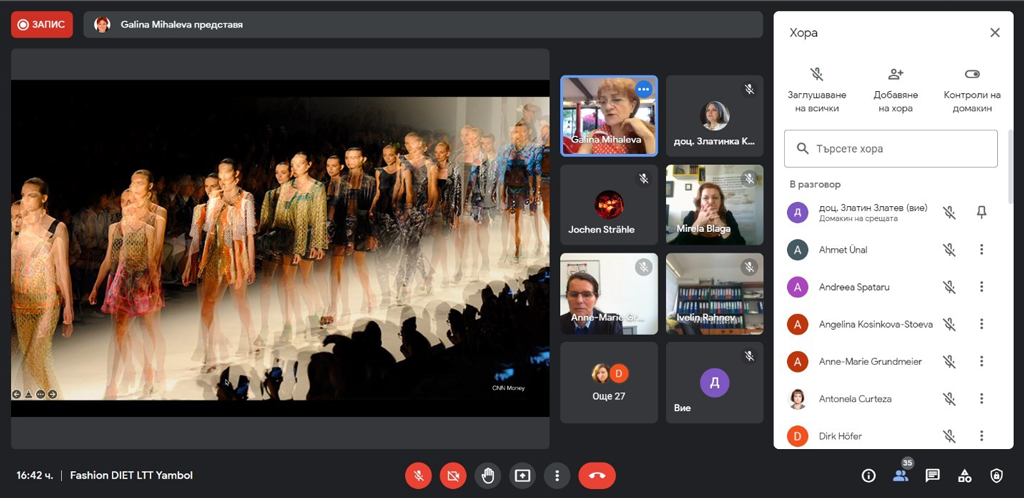
To everyone’s great surprise Ms. Tsvetelina Penkova, the youngest Bulgarian member of the European Parliament, joined in online. She expressed her sympathy with the project’s idea on ESD and encouraged the participants to further support the project’s goals. The forum was closed with greetings and gratitude to all participants and organisers by Prof. Dr. Vanya Stoykova, dean of the Faculty of Technics and Technologies. It can be concluded that the three days of the second Fashion DIET LTT event were full of memorable and useful presentations and fruitful discussions in the field of sustainable textiles and fashion.
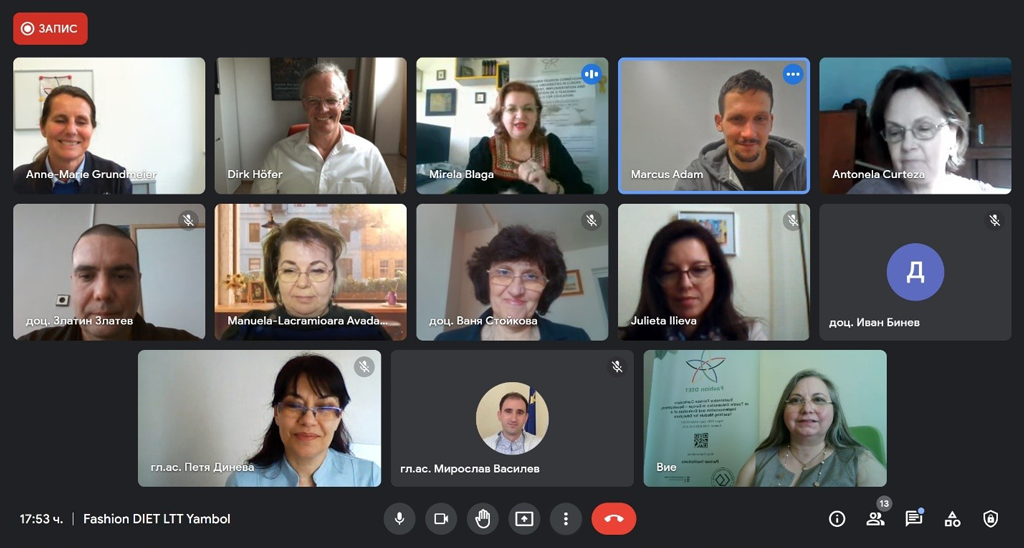
Fashion DIET consortium, May 2022

